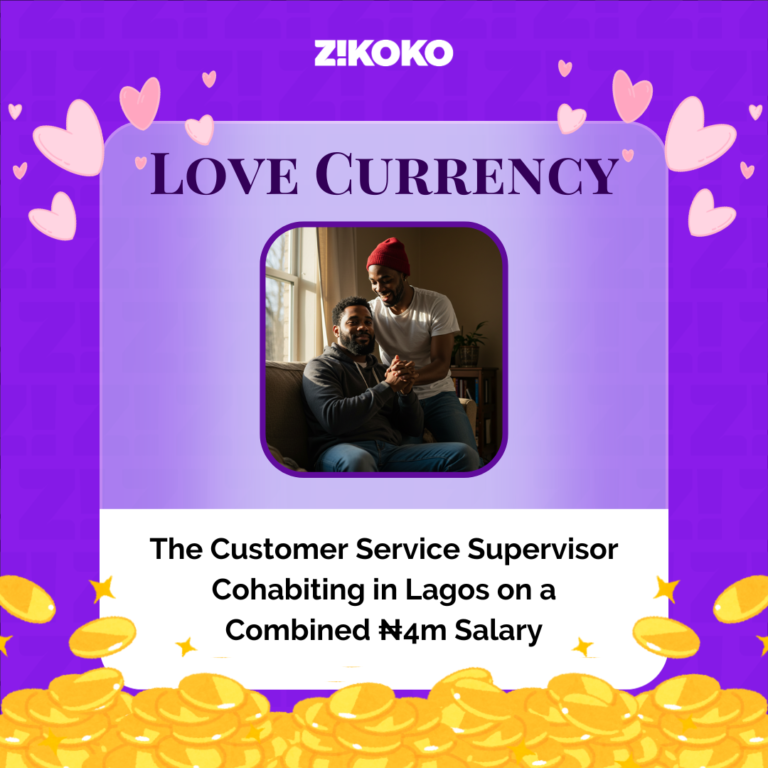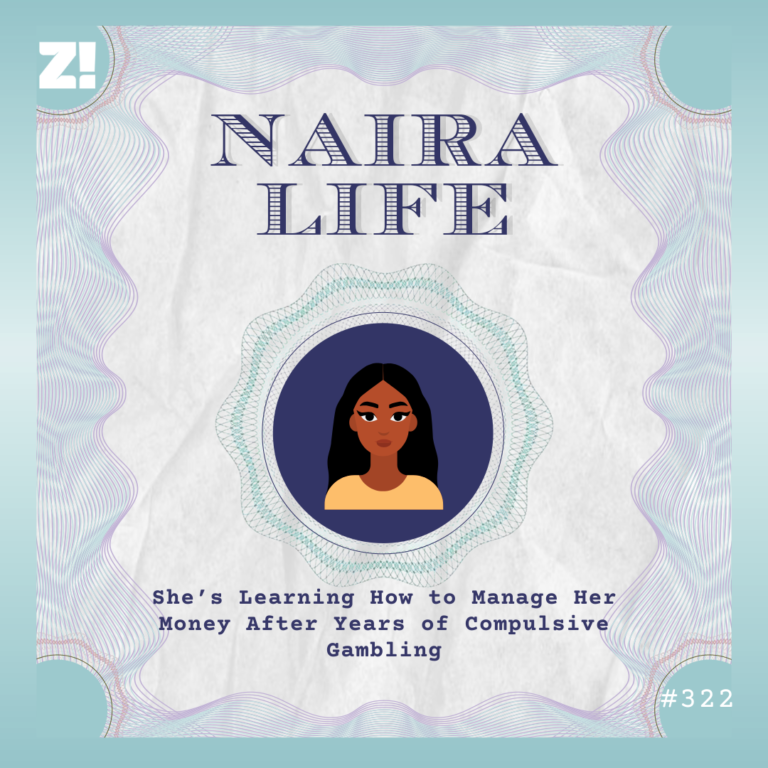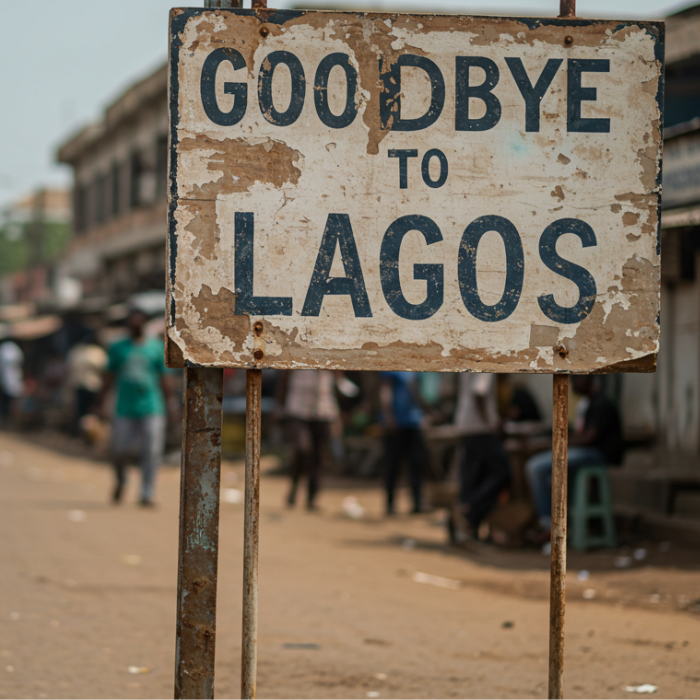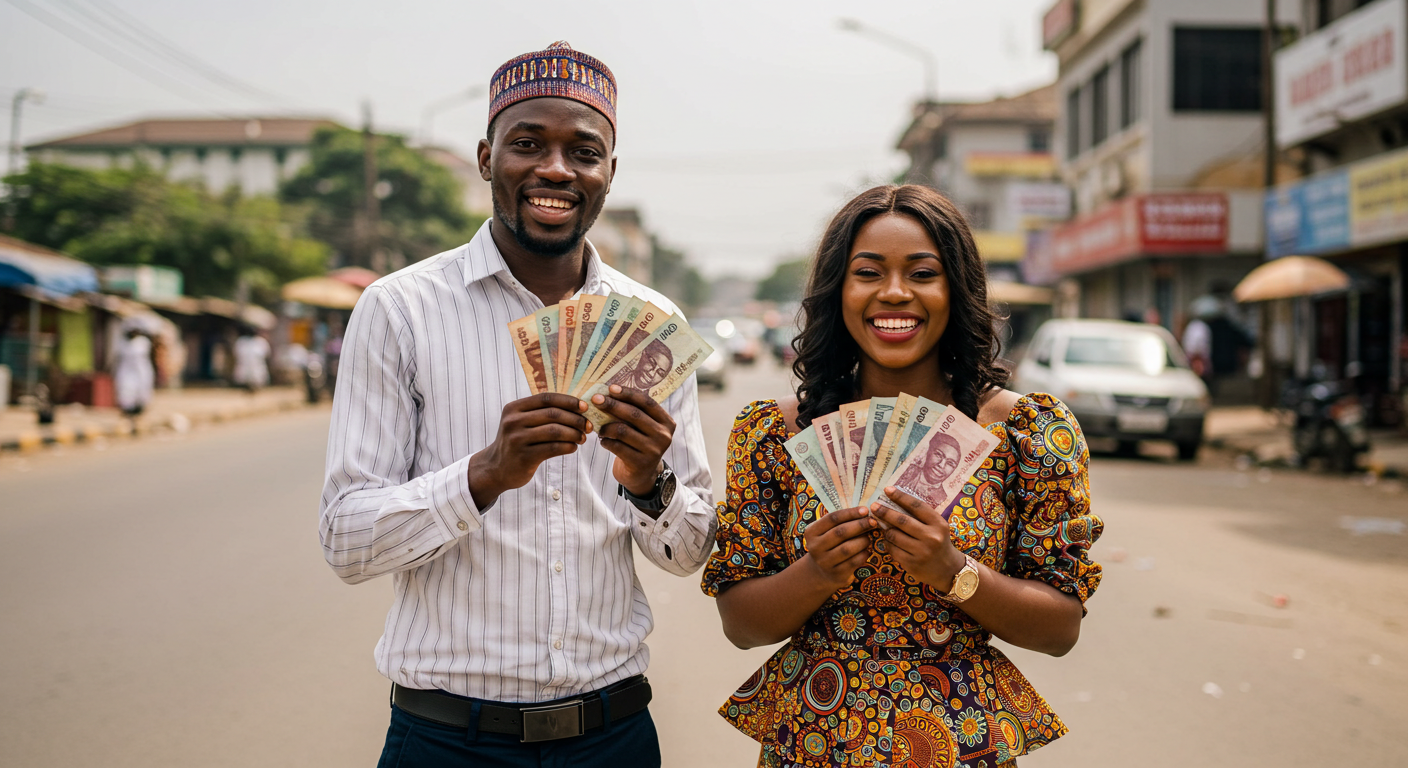Every week, Zikoko seeks to understand how people move the Naira in and out of their lives. Some stories will be struggle-ish, others will be bougie. All the time, it’ll be revealing.
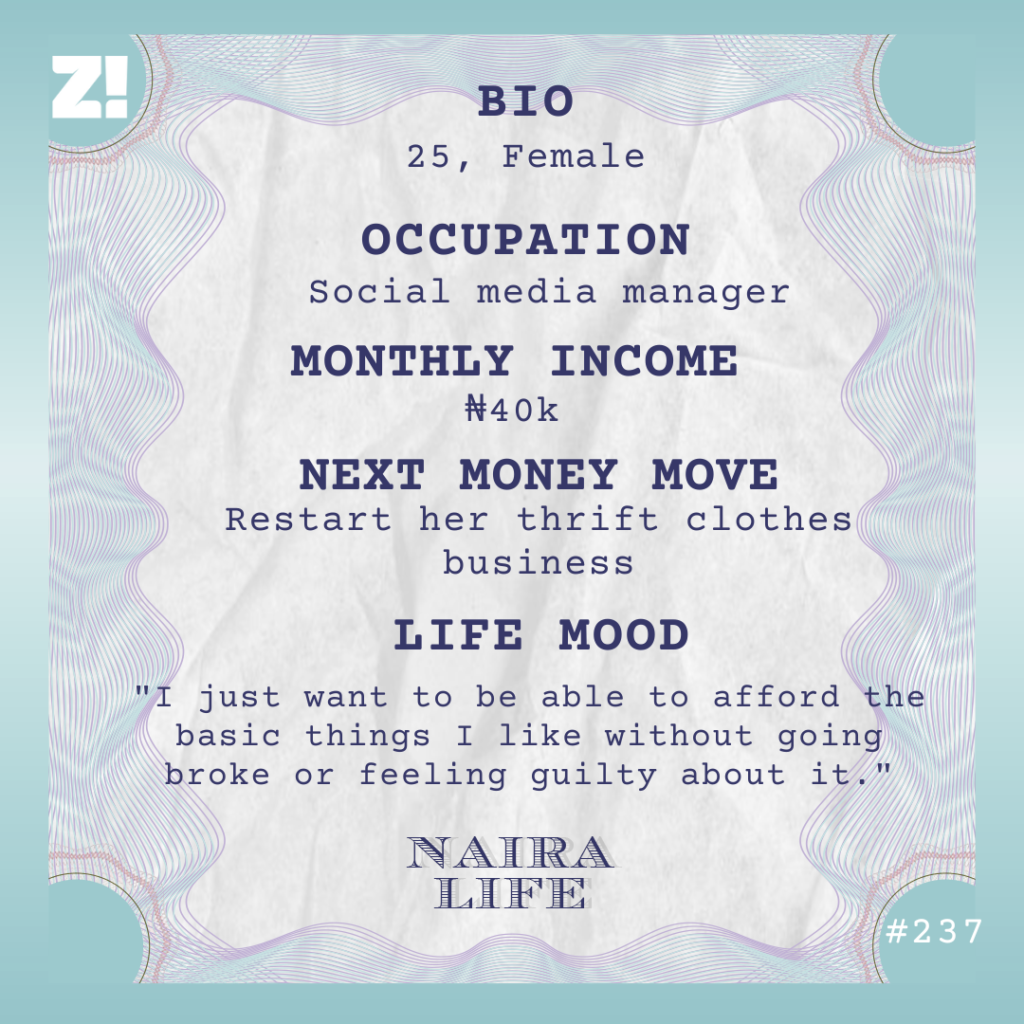
Let’s start from the beginning. What’s your earliest memory of money?
I discovered we were poor-poor when I was ten years old. I’d been disturbing my dad to buy me something that day. He sat me down and broke down how much he earned and how we spent in the house. It was a sombre experience.
How much was he earning?
His work as a church pastor paid him ₦12k/month. He didn’t always work at the church, though. He was a mason but had to stop because he was getting older and couldn’t keep up with the demands of bricklaying.
My mum carried most of the financial weight. She started as a cleaner at the primary school my sister and I attended and eventually became a teacher. The staff discount she got was the reason we could attend the school. She also saved up all her money to feed and put us through secondary school.
My parents wouldn’t eat sometimes, so my sister and I could. I think it’s part of the reason I have a messiah complex now, in addition to my other issues.
What issues?
I was diagnosed with Borderline personality disorder (BPD) in 2022, and I’ve had undiagnosed dyscalculia for as long as I can remember, even though I only found a name for it through my personal research two years ago. I struggle with numbers and typically have no clue how to handle money.
When did you first realise something might be wrong?
When I was 7 years old, a deaconess at our church asked me to tell her the time, and I just stared at the clock in fear. I knew I should know it. Instead of saying it was almost 2 p.m., I just told her that the “big hand” was on 12, and the “small hand” was close to 2. She just looked at me funny. It was so embarrassing.
Was that the only indicator that you had issues with numbers?
I also couldn’t recite the multiplications table. In school, when the teacher asked us to stand up to recite it, I’d either sneak peeks at the times table at the back of our notes or just mime along to the other students.
As an adult, I still can’t recite it. After the two times table, it’s over. Solving maths problems on my own always muddles my brain. I still can’t tell time either, except if it’s by the hour or every 30 minutes.
I’ve been scammed several times while using public transport. Like, when the conductor asks you to bring ₦1k to collect ₦500, so someone else gives you ₦700, I’m always like, “Wait first, what’s going on?” I always end up getting cheated.
How has this affected your ability to make money?
I got my first job as a typist at a computer shop when I was wrapping up secondary school in 2013. My salary was ₦12k/month, and I’d blow all the money almost immediately and start wondering why I didn’t have any money.
I quit the job in 2014 to write my first JAMB exam. I wrote the exam twice and passed both times but didn’t get admission, so my dad encouraged me to move to Ilorin for IJMB in 2016. It cost around ₦60k for the one-year period plus accommodation. I still didn’t get admission, but I was already quite independent, so I decided to move in with my friend and her grandma in Ibadan to look for a job instead of returning home. I found one as a cashier at a salon.
A job handling money. What could go wrong?
A lot. My salary was supposed to be ₦28k/month, but I always got shortages while balancing the account, and the difference would be removed from my salary. So most times, I only got paid ₦20k or less at the end of the month.
I could only afford to send ₦5k to my parents, keep a little money aside for transport fare and buy Shoprite bread or a club sandwich for small jaiye jaiye. I had zero savings. It didn’t stop me from applying to the National Open University, though.
But how did you handle school fees?
The salon I worked at allowed staff to sell additional products as long as you gave the boss 10% of every sale. I found a beard growth serum on Jumia and convinced the barbers to upsell it to their clients, promising them ₦500 on every bottle they sold. I bought the serum for ₦800 per bottle and sold it for ₦2,500, so I got about ₦1k in profit after the barbers and my boss got their share of the money.
The business was a hit. I started with just 10 bottles, but within a month, I started selling out 24 bottles in two weeks.
I even kept all the money I was making with my boss and only collected it to settle school expenses because I knew the money would disappear if I held on to it.
That was a smart decision
I did that for about a year until I decided I couldn’t keep up with the calculations I had to do as a cashier. Plus, I wanted to learn a skill I could do on my own, so I approached my boss and asked him if I could train to become a pedicurist — we offered pedicures in the salon. He agreed and allowed me to learn for free since I was already a staff member. I learned for about six months while still working as a cashier.
Then you switched from cashier to pedicurist
Yes. In 2019, I moved to our branch in Ilorin because there was no space for pedicurists where I worked. The pay also changed from a fixed salary to commissions. Every pedicurist’s monthly target was at least ₦300k, and we’d get 20%.
I wasn’t earning as much as my coworkers as it involved walking up to people to convince them to do a pedicure, and my anxiety made that really difficult. There were days when I’d be too scared or just not want to attend to anybody.
On average, though, I made about ₦60k/month — a big deal considering where I was coming from.
What were your finances like at this time?
I raised ₦120k from my savings and a loan I took from my job to rent a one-room apartment. I tried to become better at saving money, but it never worked out because there was always a reason to spend. My parents depended even more on me, and I felt like I had to be responsible for them.
Basically, I spent most of my salary on my parents and the little foodstuff I needed. They’d call me for the smallest things, and when I didn’t have, I’d borrow. I always felt guilty about buying myself any piece of clothing, except it was something I needed to wear to work.
I also abandoned uni because I didn’t have as much time as I did when I was a cashier. I worked from 9 a.m. to 9 p.m. daily and had only one day off. I just kept telling myself I’d continue when I was more settled. I never did. It was also around this time I started really noticing patterns that contributed to my BPD diagnosis.
What patterns?
I had some issues with my boss, and it was an emotionally tough period for me. I didn’t have a hold of my emotions; when I was happy, I was too happy. When I was sad or angry, it was extreme too. I even started cutting myself.
I’m sorry you went through that
Thank you. I also felt directionless, spent spontaneously and kept changing jobs. I left the salon, and within one year, I worked at four different salons because I just couldn’t stay in one place for long. At some point in 2021, I moved back to Ibadan because I was tired of working every day and living on commissions.
Were you doing anything else to make money?
Not immediately. I moved in with a friend and former coworker. She offered home-service pedicures, but I had anxiety about going to people’s houses. So it took me a couple of months to build the courage to start home services. Thankfully, she introduced me to some people, and I got three regular clients.
A pedicure session cost ₦7k, and the first client paid for two sessions in a month. The second client was a family arrangement with the wife and kids, and I got paid ₦20k for one session a month. The last client only had one session a month, too.
That brought my earnings to about ₦41k/monthly, but it wasn’t enough. I knew I had to look for a better option.
So, what did you do?
I reached out to a long-time friend in the UK. We’ve never met, but I call her my big sister. She encouraged me to write because I was always dropping long posts on Facebook.
As usual, I was anxious, but she introduced me to someone who paid me ₦1k for 800-word research articles for a real estate blog. It was small, but I was grateful for the opportunity to build my confidence. I did about 10 articles a month in addition to the home-service pedicures.
How long did you write for the blog?
About five months. And all the while, I struggled with confidence and imposter syndrome. I couldn’t even seek out other clients or try to establish myself as a writer. I always thought, “What will I even write? What if I write for someone, and they call me out as a no-nothing fraud?”
When I stopped writing for the blog, I decided I wanted to be a copywriter. My UK big sis paid for a copywriting course for me, and I learnt a lot about it. But when it came to utilising the knowledge I’d gained and putting myself out there, I shrunk and concluded I wasn’t good enough.
Oh no. Was this when you got diagnosed with BPD?
It was around that time. After I had a breakdown in 2021, I found an NGO that offered free therapy sessions, and I’ve been in therapy since then. They diagnosed me with BPD in 2022, and it explained why my life is the way it is.
I mean, one of the symptoms is spontaneous spending. I’d be broke and know I needed money to eat, but when the money came, I’d use it to do something completely different.
Was there medication involved after the diagnosis?
My therapist advised against medication, but I’m currently using Dialectical behaviour therapy to manage it.
How has treatment impacted your relationship with money?
I haven’t found my direction yet, but I think I’ve gotten to a point where I know I need to be financially better and more responsible.
I constantly feel like I’m stuck on an island with wild animals without a means of escape, and I’m supposed to somehow figure out what to do. So I just pretend like I know what I’m doing because if I don’t, it means I’m dumb.
I still feel like my inability to keep a job or focus on a skill for a long time contributes to a vicious cycle of unstable income and inability to save. So I just need to combine this knowledge that I need to be better with willingness in order to put it into action. I’m not there yet, but I’m getting there.
Rooting for you. What do you do for money these days?
I don’t offer pedicures anymore because most of my regulars have japa. Since July 2022, a former client has been paying me ₦40k monthly to manage his social media page.
I know I can earn more, but I’m still struggling to put myself out there. I’m currently learning UX Design on Coursera, but I know deep down that I may end up not using it for anything.
I’m also planning to start a thrift clothes business soon, partly to earn more and partly to settle a ₦155k debt, which I incurred while trying to secure my own apartment. I first started the thrift business in November 2022 and even started saving money from the almost ₦40k profit I made monthly, but I had to stop in April 2023 due to the debt.
How did you get into debt?
When I was raising money for my current apartment, I loaned about ₦120k from a now-ex-boyfriend to add to my savings and make up what I needed for the rent, but he started disturbing me for his money when we split, so I’m now repaying from my salary monthly.
Of course, I still have to eat, so I’ve been borrowing random ₦5k here and there to survive — which is why my debt grew to ₦155k. But hopefully, when I restart my business, my finances become better.
I already bought ₦60k worth of goods, and I’ll be selling them on Instagram.
What are your monthly expenses like?
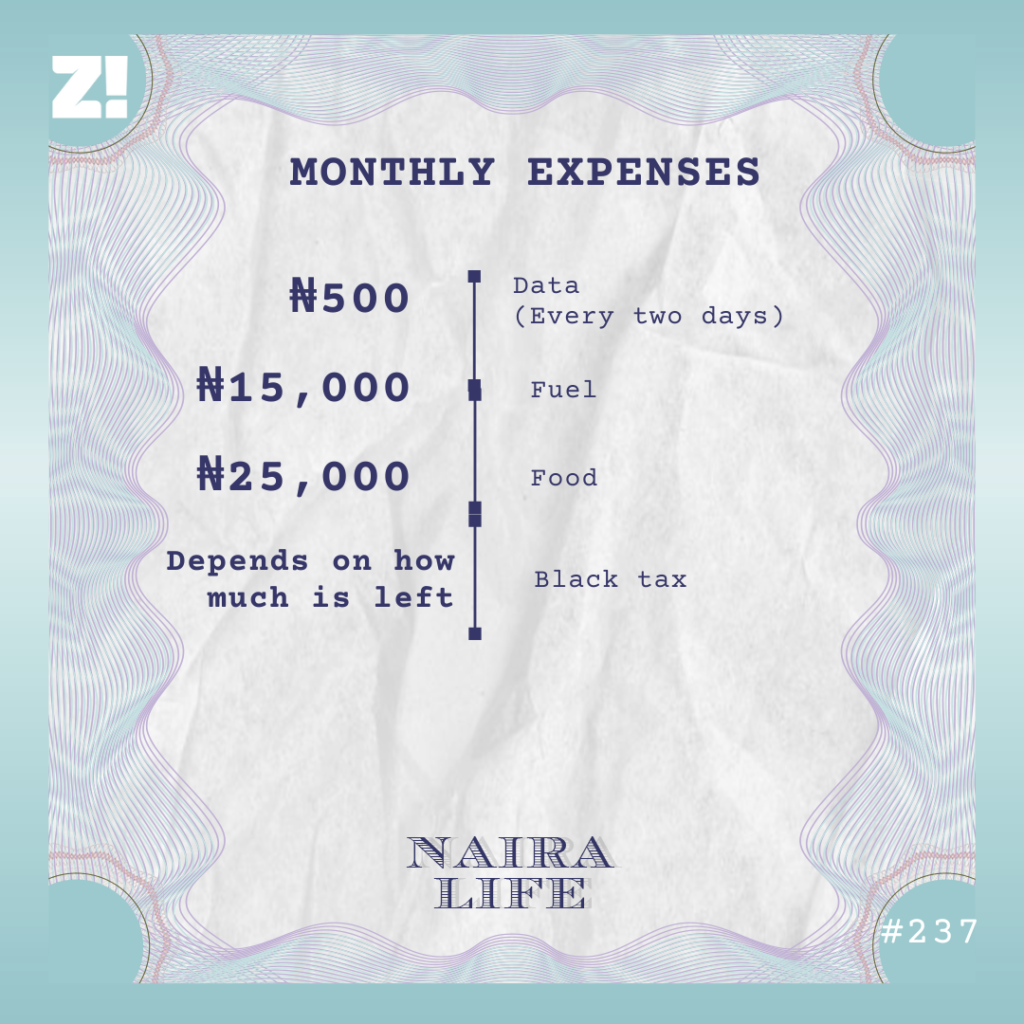
What would your ideal financial situation be?
I’ll answer hypothetically because I don’t believe I’ll get to a point where I make sound financial decisions. But it’d be great if I could afford the basic things I like without going broke or be able to buy myself stuff without feeling guilty about it.
Is there something you want right now but can’t afford?
I’d like to move my parents to a better space. I rented where they currently live for them, but it’s not great. I just want to be able to take care of them.
How would you rate your financial happiness?
-1. I’m not happy with my finances, and I desperately need to be better. I’m thankful for my friends, though. I’ve had people come through for me in amazing ways, and it’s such kindness that’s kept me sane because I really would’ve given up a long time ago.
If you’re interested in talking about your Naira Life story, this is a good place to start.
Find all the past Naira Life stories here.

